#persecution of Stephen
Link
Romans 6:23 says, "The wages of sin is death." The consequence of sin is pain, misery, destruction, and eventually death. We see this in all types of sin and it is especially the case for sexual sin." Pastor Tim Stephens looks at the ideas underlying the euthanasia and LGBTQ+ movements and how they can be embraced unwittingly by the church. We're reminded of the consequence of sinful ideas and then see the (only) answer in Jesus Christ who gives salvation as a free gift...
#Stand Up For The Truth Podcast#Pastor Tim Stephens#Evil Ideas – Death Culture’s ‘Medical Assistance in Dying’#Bible Prophecy#education#Christianity#evangelism#globalism#government#LGBTQ+#persecution#social justice#standupforthetruth.com
11 notes
·
View notes
Text
Put To Death (Acts 7:55-60)
The binary thinking of “I’m right and you’re wrong” is not an approach you’ll find in God’s Holy Word.
The Martyrdom of Stephen, by sculptor Gabriel-Jules Thomas (1824-1905)
But Stephen, full of the Holy Spirit, looked up to heaven and saw the glory of God, and Jesus standing at the right hand of God. “Look,” he said, “I see heaven open and the Son of Man standing at the right hand of God.”
At this they covered their ears and, yelling at the top of their voices, they all rushed at him, dragged…
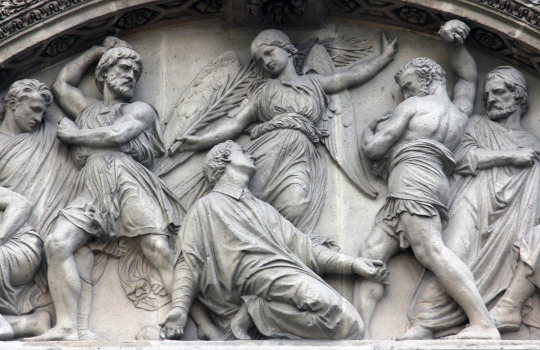
View On WordPress
#acts 7#acts of the apostles#bible interpretation#christian life#christianity#church life#forgiveness#god&039;s word#hermeneutics#hubris#humility#martyrdom#murder#new life#old nature#persecution#sinful nature#spiritual abuse#st stephen
0 notes
Text
Pain, Sickness and Injury vs. The Hope of Glory
Sickness, surgery and unexpected injury can run roughshod over your best laid plans. I have found that An extended convalescence can pretty much disrupt everything in your service to God & ministry. [Except His Presence & personal comfort, which never fail, no matter the circumstance]. But it sure feels good, when you begin to recover and your strength returns; that as your senses refresh. You…

View On WordPress
#Christian growth#Covid-19#End of life#Faithful#Get back up#Injuries#pain#Persecution#Recovery#Rejuvenation#restoration#Sickness#Stephen#Stoning#Suffering#weight of glory
0 notes
Text
by Matt Lebovic
“[Harvard] contributed to Nazi Germany’s efforts to improve its image in the West,” wrote historian Stephen Norwood in his book, “The Third Reich in the Ivory Tower: Complicity and Conflict on American Campuses.”
“Harvard’s administration and many of its student leaders offered important encouragement to the Hitler regime, as it intensified its persecution of Jews and expanded its military strength,” Norwood wrote.
Conant “was not just silent” about antisemitism, said Norwood, but “actively collaborated in it.”
In May 1934, Conant was publicly mute during the visit of the Nazi warship Karlsruhe to Boston, some of whose crew members were entertained at Harvard.
The next year, Conant permitted Nazi Germany’s top diplomat in Boston to place a wreath bearing the swastika in a Harvard chapel, according to Norwood.
Throughout the 1930s, Harvard tried to keep out Jewish refugees — and especially Jewish professors — as demonstrated in research on European scholars who attempted to flee Hitler.
Conant did not speak out against Nazism until after the Kristallnacht pogrom in November 1938. Three years had passed since the Nuremberg race laws stripped German Jews of citizenship.
67 notes
·
View notes
Text
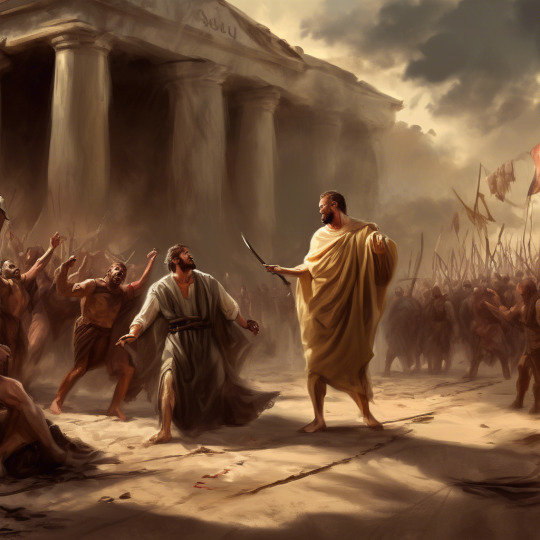
Today I am continuing my study of Acts 8.
This passage begins with a brief discussion about Saul. He was present for the stoning of Stephen and he condoned it. What else did he do to Christians to persecute them?
Saul was a devout Pharisee who zealously persecuted early Christians before his conversion on the road to Damascus. Some of the specific things he did to persecute Christians included:
1. Approving the stoning of Stephen: Saul was present and gave approval for the stoning of Stephen, the first Christian martyr (Acts 7:58-8:1).
2. Persecuting believers: Saul went from house to house, dragging off both men and women who believed in Jesus, and putting them in prison (Acts 8:3).
3. Breathing out murderous threats: Saul was filled with zeal for persecuting Christians and sought authorization from the high priest to go to Damascus to arrest followers of Jesus (Acts 9:1-2).
4. Persecuting the church: Saul was known for his violent persecution of the church, even going as far as to travel to foreign cities to find and arrest believers (Acts 26:11).
Saul's persecution of Christians was driven by his fervent belief that he was defending the Jewish faith against what he saw as a blasphemous sect. However, his encounter with Jesus on the road to Damascus led to a radical transformation in his life, and he became one of the most influential figures in the early Christian church.
People are always in a hurry to point out that Saul became Paul. To really appreciate this though you have to appreciate how horrible the things he did to Christians were.
If Saul can be saved then who can’t be?
#bible study#bibledaily#bible#christianity#jesus christ#gospel#bible scripture#jesus#daily devotion#bible wichapas
16 notes
·
View notes
Text
So...apparently the first Christian martyr Stephen was killed under Saul of Tarsus?
And that's just like. Wow. God can redeem and use anyone for His glory. The man who oversaw the killing of the first martyr went on to become the man who wrote many of the epistles and went around evangelizing and wound up so persecuted for spreading the faith that he was himself beheaded. And now he's known as a great Christian figure for advancing God's Kingdom.
There really is hope for all of us, isn't there?
16 notes
·
View notes
Text
Stephen Miller
The petty attacks on President Trump from some in the GOP demonstrate a glaring ingratitude and grave failure to understand the harrowing moment in which we find ourselves.
President Trump is facing regime persecution like nothing ever witnessed before in this nation’s history. All because he’s fighting for us against them. Against the ruling class. Against the Deep State. Against the neocons and neo-fascists.
Fighting to end their reign. Fighting to stop their wars. Fighting to reverse their assault on our citizenry and nationhood.
He’s facing down a thousand years in prison so that we might recapture our freedom. If he submitted to their corrupt demands it would end tomorrow — but he won’t submit because he is our gladiator in the arena, battling for our families and futures.
We are on the doorstep of a Third World War and on the precipice of the complete and irrevocable dissolution of our own territorial sovereignty.
President Trump is the one who will resurrect our peace and restore our land.
Imagine then choosing this moment, as he faces down one merciless political persecution after another, to engage in personal slights, pile-ons and piddling polemics.
How about saying two simple words to the man who has endured so much for us all: THANK YOU.
27 notes
·
View notes
Text
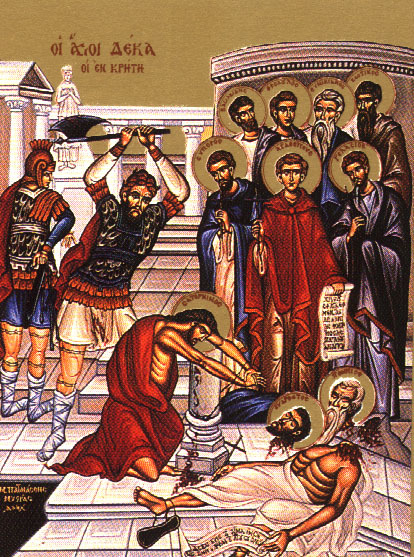
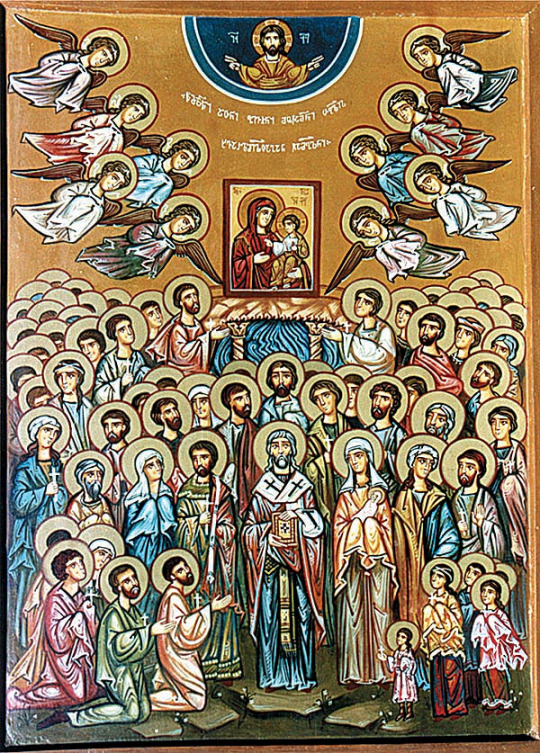
Who are the martyrs?
Derived from the Greek word meaning "witness," a martyr is someone who suffers persecution and death for their faith in Christ. Saint Gregory the Theologian, the 4th Century Patriarch of Constantinople, once said that "it is mere rashness to seek death, but it is cowardly to refuse it" in witnessing to our faith in Christ. Over the past two millennia martyrs have been a symbol of strength for the faithful, a sign that God is more powerful than death. All of the Apostles, who experienced the Risen Jesus, except for St. John the Evangelist, were put to death for their faith in Christ. That so many Christians who knew Jesus were willing to die for their claim that "Jesus is Lord" (1 Corinthians 12:3) gives a powerful witness to us about who Jesus is. As St. Justin the Martyr wrote in the 2nd century just before his own execution in Rome for the faith circa 155AD: "for it is plain that, though beheaded, and crucified, and thrown to wild beasts, and chains, and fire, and all other kinds of torture, we do not give up our confession of faith; but, the more these things happen, the more others, in even larger numbers, become faithful." This persecution of Christianity has continued through the centuries. To this day, Orthodox Christians continue to be persecuted under Communism, various dictatorships, and other religions. In fact, more Orthodox Christians died for their faith in the 20th century under Communism in the former Soviet bloc countries than in all the persecutions carried out by the Roman Empire during the first 300 years of Christian history.
St. Stephen (In Greek, stephanos means 'crown') was the first person in history to be executed for being a Christian. His story is told in the New Testament by Luke the Evangelist in the Acts of the Apostles (6:1-7:60). A "man full of the Holy Spirit," he was one of the seven deacons chosen by the Apostles to minister to the Greek-speaking Christians of the first community in Jerusalem. Arrested for his public preaching of Jesus Christ, he was -- like his Master before him -- brought before the Sanhedrin. For his witness before the Sanhedrin to Jesus as the crucified and risen Messiah, he was condemned to death by stoning. Taken outside the city walls, he was brutally stoned to death by an angry mob. Stephen was the first of a long line of many, many men and women who have paid the full price in blood for their faith in Jesus Christ.
[Source of text: The Divine Liturgy of our Father among the Saints John Chrysostom (with Commentary and Notes)]
18 notes
·
View notes
Text
According to Zionist logic, the following historical figures would have been considered “Hamas Terrorist Nazi Antisemites” because they were a) critical of Israeli war crimes and b) supported Palestinians:
Reverend Dr. Martin Luther King Jr.
Mahatma Gandhi
Malcolm X
Fred Hampton
Nelson Mandela
Albert Einstein (is Jewish)
Stephen Hawking
Frida Kahlo (is Jewish)
Noam Chomsky (is Jewish)
DJ KHALED 🗣️🗣️🗣️🗣️🗣️
Muhammad Ali
Jimmy Carter
Ben and Jerry (the ice cream people)
Bernie Sanders (is Jewish)
Susan Sarandon
Now, let’s look at some of the people who have supported Israel since its creation and do to this day/until their death beds:
Donald Trump
Joseph Stalin
Joe Biden
George W. Bush
Bibi Netanyahu (Israeli PM)
Hillary Clinton
Jefferey Epstein
According to Zionist logic, the man who called white supremacists in Charlottesville who chanted “Jews will not replace us”, “fine good people” and the dictator of the USSR who actively persecuted Jews in SSRs like Lithuania, Sakartvelo, and Russia are both actually based liberal kings
19 notes
·
View notes
Text

Image by Robert Barnes
Against The Fall Of Night
Number One • World Trade Center
There are people on this Earth that would bring another age of darkness. They seek destruction, they seek chaos, they have no conscience, they know no pity or empathy for their fellow man. The would burn books they dislike. They persecute those who worship God in a manner different from their own. They would subjugate women as chattel and legalize slavery of their neighbors. They would rule the world or destroy it.
They come from all varieties of national, ethnic and religious diversity found on our planet. They are forces of ignorance and destruction. Their brand of hatred leaves no room for Truth or Love.
We stand as a family, a people, a nation — against this tide of evil.
I shot this image of the World Trade Center in 1980 while working to open the CNN New York Bureau in the lobby. It is the companion piece to my other work titled “The Fabric of Civilization”.
+
From my friend Rob Barnes, who passed away in 2015.
This is the realm of the passing away. All that
exists does not for long.
Whatever comes into this world never stops sliding
toward the edge of eternity.
Form arises from formlessness and passes back,
arising and dissolving in a few dance steps between
creation and destruction.
We are born passing away.
Seedlings and deadfall all face forward.
Earthworms eat what remains.
We sing not for that which dies but for that which
never does.
~ Stephen Levine
from “Breaking the Drought:
Visions of Grace”
19 notes
·
View notes
Text
by Eunice G. Pollack and Stephen H. Norwood
Many Arabs stressed that even before "Zionist ... pretensions" threatened the "happy relationship" between Muslims and Jews, it had been disrupted by the imposition of European colonial rule.[13] They informed their Western audiences that Jews had "enjoyed all the privileges and rights of citizenship" before colonialism introduced an "artificial separation" between Muslim and Jew. A Moroccan political leader insisted that for this reason the Jews had "welcomed" the overthrow of colonial rule and the return of "Arabization" and the establishment of the independent Muslim nation.[14]
Contrary to the Arabs' contentions, however, it was the colonial powers that had extended citizenship (e.g., Algeria in 1870), equality or near-equality (e.g., the French Protectorate in Morocco, 1912–1956) to the Jews, liberating them at last from their status as subjugated, humiliated dhimmis, and ending the oppressive jizya, the tribute always exacted by the Muslims. Thus Jews had strongly endorsed the colonial presence, generally embracing modern European education and culture.[15] It was under British occupation (1882–1922) that Jews in Egypt felt safest. Notably, under Islamic rule, it was only the Ottoman Empire that, in an effort to secure European support—and modern weapons—issued an Imperial Edict (1856) that, in theory, extended equal rights to all its subjects. In practice, however, Ottoman governors (pashas) confined themselves to collecting taxes, while local rulers and the populace—for example, the Mamluks in Egypt—continued to persecute, pillage, and impose additional "heavy levies" on the Jews. Thus most Jews not only supported European colonial rule, but feared the independence movements, with the threat of return to their earlier subordinate "social, political and economic" positions.[16]
Islamic Myths about Jews' Inherent Traits
Arab commentators readily dismissed over two centuries of travelers' accounts and investigative reports that belied their claims about the conditions and contentment of Jews under Islamic rule. They simply turned to another hoary myth in order to protect their current fable. The Arabs discarded all the testimony that contradicted their narrative, explaining that it had been derived largely from Jews, whom the Qur'an characterized as congenitally deceitful, never to be trusted.[17]
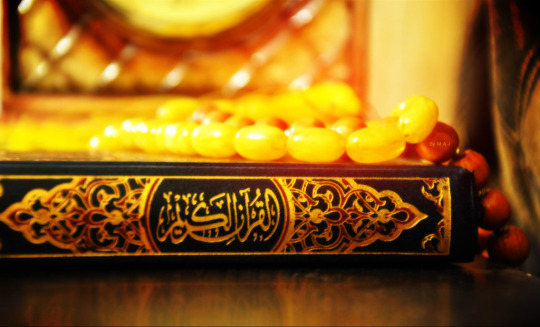
At times, political and religious leaders conceded that the Jews in Muslim lands had been relentlessly subjugated, relying on another large cache of myths, drawn or extrapolated from the Qur'an, to sanctify their abasement of those they now identified as "the dogs of humanity." Indeed, from the earliest years of Islam, Muslims had understood that "their deadliest enemies were the Jews."[19] They were the only people cursed in the Qur'an, whom Allah had promised "degradation in this world and a mighty chastisement in the next world." Muslim theologians recognized that the Jews were "like germs of a malignant disease where one germ is sufficient to eliminate an entire nation." But, they taught, "the Holy Qur'an ... constitutes the microscope through which we can see the pests and poisons that reside in their minds and hearts." Thanks to Qur'anic lessons on how to subdue the Jews, the Muslims were "the only people on earth to tolerate them" in their midst.[20]
Citing the Qur'an, prominent Muslim educators portrayed the Jews as driven throughout their history to bring "blind sedition ... and intrigue in any land or community where they happened to live." Some suggested that this was likely "why the Israelites ... were so detested by all surrounding tribes."[21] Others explained that "the Jews themselves have not changed" because, "according to ... their false Torah," they "are required to stir war with their neighbors once they have the opportunity to do so." Some added that the Jews often preferred to deploy "conspiracies, plots, intrigues [and] sedition" because they were inherently "cowards and could not openly face their enemy."[22]
Not acknowledging a contradiction, many spokesmen insisted that "the Jews have always been criminal aggressors." Jews claim that they are victims, "subjected [throughout] their long history" to "oppression and persecution" "for no other reason than their being followers of Moses." In truth, "the hatred felt by various peoples ... for Jews was not due to their belief, but their ... unchangeable behavior, always based on exploitation, ingratitude and evil-doing in return for kindness." That is, the "criminal aggressors" only deceptively identify as innocent victims.[23] Educators taught that the Jews are "avaricious, ruthless, cruel, hypocritical and revengeful. These traits govern their lives." They point out that the Qur'an warned that, if permitted, the Jews would "become great tyrants." They conclude: "No good is expected of them unless they live under the aegis of Islam as loyal and obedient subjects." Then the Muslims "will treat them ... tolerantly." "Islamic tolerance is," after all, in complete contrast to "Jewish intolerance and cruelty."[24]
13 notes
·
View notes
Text
youtube
Unseen Warfare
THE DIABOLIC IN YOUR LIFE
(2 minute read)
Is there discord in your family, infighting in your business or corporation, factions in your religious organization and war in your neighborhood? If so, you may want to watch the homily by Venerable Bishop Fulton J. Sheen on the actions of the diabolic in our daily life.
𝑺𝒐 𝑰 𝒋𝒖𝒔𝒕 𝒍𝒆𝒂𝒗𝒆 𝒚𝒐𝒖 𝒘𝒊𝒕𝒉 𝒕𝒉𝒊𝒔 𝒄𝒉𝒂𝒓𝒂𝒄𝒕𝒆𝒓𝒊𝒔𝒕𝒊𝒄 𝒏𝒐𝒕𝒆 𝒐𝒇 𝒕𝒉𝒆 𝒅𝒊𝒂𝒃𝒐𝒍𝒊𝒄 𝒇𝒓𝒐𝒎 𝒕𝒉𝒆 𝒑𝒔𝒚𝒄𝒉𝒊𝒂𝒕𝒓𝒊𝒄 𝒑𝒐𝒊𝒏𝒕 𝒐𝒇 𝒗𝒊𝒆𝒘. 𝑻𝒉𝒆 𝒃𝒓𝒆𝒂𝒌𝒖𝒑 𝒐𝒇 𝒖𝒏𝒊𝒕𝒚, 𝒕𝒉𝒆 𝒃𝒓𝒆𝒂𝒌𝒖𝒑 𝒐𝒇 𝒇𝒂𝒎𝒊𝒍𝒊𝒆𝒔, 𝒕𝒉𝒆 𝒃𝒓𝒆𝒂𝒌𝒖𝒑 𝒐𝒇 𝒄𝒐𝒓𝒑𝒐𝒓𝒂𝒕𝒊𝒐𝒏𝒔, 𝒕𝒉𝒆 𝒃𝒓𝒆𝒂𝒌𝒖𝒑 𝒐𝒇 𝒓𝒆𝒍𝒊𝒈𝒊𝒐𝒖𝒔 𝒄𝒐𝒎𝒎𝒖𝒏𝒊𝒕𝒊𝒆𝒔, 𝒕𝒉𝒆 𝒃𝒓𝒆𝒂𝒌𝒖𝒑 𝒕𝒉𝒆 𝒐𝒏𝒆𝒏𝒆𝒔𝒔 𝒐𝒇 𝑪𝒉𝒓𝒊𝒔𝒕 …
(The concise description in the video of the action of the diabolic begins at 4:43 and ends at 11:24. But for further details, please finish watching the video.)
“I thought perhaps you might be interested in hearing about the Devil from a sound philosophical and theological point of view. I'm going to describe to you the Devil, first from the psychiatric point of view, and secondly from the biblical. First the psychiatric.
It is interesting that as we drop things in the Church the world begins to pick them up and distorts them. Now we, for example, the nuns drop the long habits, the girls put on maxi coats. We stop saying the beads, hippies put the beads around their neck. And, as theologians dropped the demonic, the psychiatrists picked it up.
[Dr.] Rollo May of Rockefeller Institute has several chapters in his work on psychiatry on the diabolic. What is the diabolic from the purely psychiatric point of view? Dr. Rollo May analyzes the word diabolic, it comes from the Greek words dia and ballein. Diaballein is to tear apart, rend asunder. Anything, therefore, that breaks pattern, that destroys unity, that corrupts gestalt, produces discord, that is the diabolical. Now, there has been a great increase of the diabolic. Notice for example the discord in the Church, the discord in religious communities, the discord among the laity regards the Church, discord in the clergy. All these are manifestations of a spirit of the diabolic that surrounds us.
Now this psychiatrist [Dr. May] analyzes the way in which the diabolic works. And he mentions three: First love of nudity. Secondly, violence, aggressiveness. Thirdly, split personalities, no inner peace, disjointed minds.
[ … ]
Our Blessed Lord one time went into the land of the Gerasenes… and he found in this land a young man possessed of the Devil (Mark 5:1-20). The Gospel mentions three characteristics of this young man. First he was nude. Secondly, he was violent and aggressive. They could not even keep him in chains. And thirdly, his mind was split, schizophrenic. Our Lord said to him, "What is your name?" He said, "My name is Legion."
Now a legion in his time meant six thousand soldiers in the Roman army. See already he is a person and yet he is legion, six thousand others. My name is legion for we are many. See the personality is no longer unified, I, Legion, we many. Now this psychiatrist does not ever correlate his three manifestations of the diabolic with this young man in the Gospel. I am doing that because I could not help but notice the similarity between the two. So from just a superficial point of view, the diabolic disrupts, and whenever you have a great manifestation of the Spirit you always get the Devil working. When for example, Moses in the Old Testament worked miracles against Pharaoh, Pharaoh's agents simulated a few miracles. When the Holy Spirit came upon the early Church at Pentecost, there was the persecution of Stephen. We had a Vatican Council, the blessing of the Spirit upon the Church. And we have immediately the manifestation of the evil spirit.
So I just leave you with this characteristic note of the diabolic from the psychiatric point of view. The breakup of unity, the breakup of families, the breakup of corporations, the breakup of religious communities, the breakup the oneness of Christ … “
7 notes
·
View notes
Text
Today I am beginning my study of Acts 7.
In this chapter of the Bible, Stephen, one of the early Christian disciples, gives a powerful speech before the Jewish religious leaders. He recounts the history of the Israelites, starting with Abraham and continuing through the patriarchs, Joseph, and Moses. Stephen emphasizes how God was always present and working in the lives of His people, even when they faced challenges and opposition.
Stephen's speech angers the religious leaders, and he is ultimately stoned to death for his faith. This event marks the beginning of intense persecution against the early Christians in Jerusalem. Despite the tragic ending to Stephen's life, his boldness and unwavering faith serve as an inspiration to believers to stand firm in their convictions and trust in God no matter the circumstances.
The story of Acts 7 reminds us of the courage and commitment of the early Christians, and the importance of standing up for our faith even in the face of adversity. It also highlights the power of the Holy Spirit working through individuals to proclaim the message of Jesus Christ.
How do you face adversity? Why do you stand up in public to defend your faith? Are you persecuted for it?
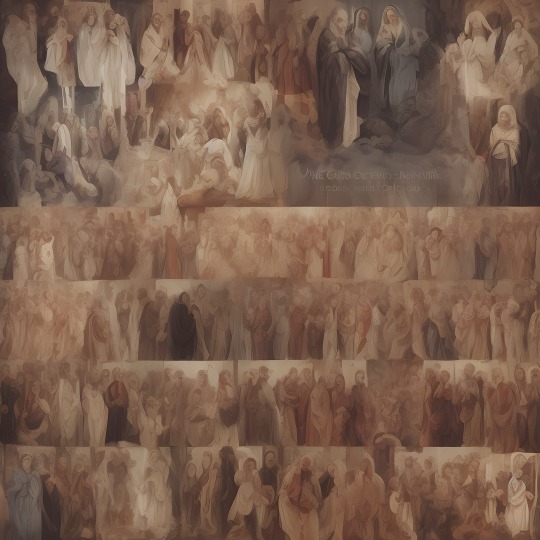
#bible study#bibledaily#bible#christianity#jesus christ#gospel#bible scripture#jesus#daily devotion#bible wichapas
12 notes
·
View notes
Text

Happy Lucia 🌟
Saint Lucy's Day, also called the Feast of Saint Lucy, is a Christian feast day observed on 13 December. The observance commemorates Lucia of Syracuse, an early-fourth-century virgin martyr under the Diocletianic Persecution.[1] According to legend, she brought food and aid to Christians hiding in the Roman catacombs, wearing a candle lit wreath on her head to light her way, leaving both hands free to carry as much food as possible.[2][3] Because her name means "light" and her feast day had at one time coincided with the shortest day of the year prior to calendar reforms, it is now widely celebrated as a festival of light.[4][5] Falling within the Advent season, Saint Lucy's Day is viewed as a precursor of Christmastide, pointing to the arrival of the Light of Christ in the calendar on December 25th, Christmas Day.[1][6]
Saint Lucy's Day is celebrated most widely in Scandinavia, Italy and the island nation of Saint Lucia, each emphasising a different aspect of her story.[2] In Scandinavia, where Lucy is called Santa/Sankta Lucia, she is represented as a woman in a white dress symbolizing a baptismal robe and a red sash symbolizing the blood of her martyrdom, with a crown or wreath of candles on her head.[7]
In Norway, Denmark, Sweden and Swedish-speaking regions of Finland, as songs are sung, girls dressed as Saint Lucy carry cookies and saffron buns in procession, which symbolizes bringing the Light of Christ into the world's darkness.[7][8] In both Catholic and Protestant churches, boys participate in the procession as well, playing different roles associated with Christmastide, such as that of Saint Stephen or generic gingerbread men, Santa Clauses, or nisses. The celebration of Saint Lucy's Day is said to help one live the winter days with enough light.[7]
A special devotion to Saint Lucy is practised in the Italian regions of Lombardy, Emilia-Romagna, Veneto, Friuli Venezia Giulia, Trentino-Alto Adige, in the north of the country, and Sicily, in the south, as well as in the Croatian coastal region of Dalmatia. In Hungary and Croatia, a popular tradition on Saint Lucy's Day involves planting wheat grains that grow to be several centimetres tall by Christmas Day, representing the Nativity of Jesus.[6
Source: Wikipedia
7 notes
·
View notes
Text
At the end of August, some 70 youth were detained in Nigeria’s southern Delta state, accused of organizing a same-sex wedding. Another 76 people were detained in October for organizing a similar event in the northeastern Gombe state. These mass detentions seem to send a clear message: LGBT people are less welcome than ever in Nigeria, the most populous state in Africa, at nearly 240 million inhabitants.
That is certainly how it seems to Francis Ndimele. Only a month after the mass arrest in August, which made headlines, he forced to emigrate from his home in Lagos to the United States. “My parents disowned me in 2020 after discovering I was gay. I had the support of an LGBTQI+ group that gave me shelter in Lagos. Despite this, my family kept sending police officers to chase me. They believe my sexual identity is an embarrassment to the family, especially since they are clergymen from an apostolic church. And the Nigerian police use the arrest of LGBT+ people for extortion, knowing that the law does not protect us,” the 24-year-old says, bitterly.
In 2014, the then-president of Nigeria, Goodluck Ebele Jonathan, enacted legislation banning same-sex relationships, as well as any public display of same-sex affection or membership of LGBTQ+ groups. The law imposes a penalty of up to 14 years in jail for anyone who “enters into a same-sex marriage contract or civil union,” and sentences up to 10 years in jail anyone who “registers, operates, or participates in gay clubs, societies, and organizations” or who even supports said groups. Nigerian lawyers and human rights activists argue that the draconian law is a violation of basic universal freedoms, and that the police regularly use it to make arbitrary arrests, and even to torture arrestees.
Lagos-based lawyer Chizelu Emejulu defends LGBT people in different Nigerian states. He says, “It seems that [the anti-LGBT law] was only passed in order to harass and extort.” It is an instrument of the government “to suppress democracy,” he says. Emejulu points out that no one has been convicted in the African country since the homophobic law came into effect a decade ago, and says that all the individuals who were arrested during the most recent raid were released on bail, although the court has ordered them to appear every month since. No charges have yet been brought against them.
Nigerian police applied the law for the first time in 2019, when they processed 47 men for “public show of same-sex amorous relationship,” according to human rights organizations like Human Rights Watch, although that case was dismissed because the prosecution did not present any witnesses in court.
In January, the United Nations Commission on Human Rights joined critics of the law with its Universal Periodic Review, a periodic review that analyzes the state of human rights around the world every four and a half years. The U.N. recommended that the Nigerian government withdraw the anti-homosexuality law, the liberation of anyone who had been arrested based on their sexual orientation and the end of persecution of the LGBT community, according to Human Rights Watch, which warns that this kind of recommendation has “little to no impact” on these kinds of issues.
Parades of humiliation
Human rights activists have also raised the alarm over Nigeria’s latest group arrests being paired with a humiliating police tactic: pre-trial media parades of detainees. The Nigerian Supreme Court declared in 2022 that this practice violates the Constitution, but during last August’s arrest, the police operation was streamed live on social media, as has been the case with most homophobic arrests.
Lawyer Stephen Okiroro stresses that these practices go against Section 36 of the Nigerian Constitution, which guarantees the presumption of innocence. “Public parading of suspects by Nigerian security agents was common during the military era, when the repressive military government suspended several human rights laws. Now we have a democratic government, and one of its values is fundamental human rights,” he says.
Only 22 of the 54 African countries allow same-sex relationships. Although in Nigeria, the law establishes prison sentences, in 12 of the country’s 36 states where Sharia (Islamic law) is in force, the death penalty can be applied to members of the LGBT community or to those who go against traditional norms of behavior. In November, local media reported the arrest of eight young men for “immoral dress.” The accusation: dressing in garments considered to be women’s clothing. The punishment: three months in prison and 10 lashes. “Transvestism” is being targeted by the federal government, warn organizations such as Human Rights Watch. In April, a legislator introduced an amendment to the law against same-sex marriage that imposes penalties of six months’ imprisonment or fines of 500,000 naira ($513).
The privilege to flee
Those who can, escape this suffocating environment. “I had already planned to travel and had my visa, but I got help from human rights advocates to pay for my flight reservation to the United States, where I now consider myself safe,” says Ndimele, the young man persecuted by his relatives. “My parents are happy that I am no longer around and that their church members can no longer make fun of them.” Daniel Orji, who lived in the southwestern Nigerian state of Ogun, also left the country after being fired from his job. “A colleague saw me in a gay venue when I was on vacation, took pictures of me on the sly and sent them to the office. They fired me and asked me never to come back, under threat of reporting me. I got a job in the U.K. and moved about six months ago,” he says. “[In Nigeria] we face all kinds of discrimination from people at work and in all other social encounters. I feel very sorry for those who can’t travel like me. It’s really hellish.”
Ndimele and Orgi were lucky to be able to flee the country, but leaving isn’t an option for everyone. One of the people who don’t have that privilege is Kunle Adeagbo, who says he has been detained and extorted on various occasions. “I live in fear. The law doesn’t just allow the police to treat LGBT people in an inhumane way, it also subjects us to mob violence. I was once injured in the street on the way to a party. But it was hard for me to go and report it at the police station because of the stigmatization and discrimination committed by those who are supposed to protect the lives and property of citizens.” Adeagbo eventually worked up the courage to report his assailants, but the accusation backfired. “The police detained me, tortured me, kept me in custody and forced me to confess that I’m gay. They only released me after I paid them,” he says. “We are not asking for very much, we just want the violence to stop so that human rights defenders and organizations that provide services to LGBT people can freely support us.”
The spokesperson for the Nigerian police force, Muyiwa Adejobi, did not respond to calls or text messages sent by this publication. The Nigerian Minister of Justice did not respond to questions, either.
A law that violates the Constitution
Benjamin Abiboye, human rights lawyer, says that Article 40 of the Nigerian Constitution states that every citizen has the right to freely assemble and associate with others, and in particular, form or belong to political parties, unions or any other association to protect their interests. “So, why should the anti-LGBT law punish people for gathering peacefully? Why should the government look the other way when there is mob violence against them?” he asks. The law Nigeria passed in 2014 “is the most repressive law passed since the return of democracy to the country in 1999,” he says. Okiroro agrees: “Freedom of association is a fundamental human right in a functioning democracy, and it is essential that the government provide space for people to express different views and defend their common interests.”
In addition to violating the Nigerian Constitution, the homophobic law also violates international human rights agreements, like the African Charter on Human and Peoples’ Rights, which guarantees the right to freedom of expression, freedom of association, freedom of assembly and the equality of all people. The International Covenant on Civil and Political Rights, which Nigeria assented to with reservations in 1993, assures the equality of all people before the law and their right to not suffer from discrimination.
5 notes
·
View notes
Text
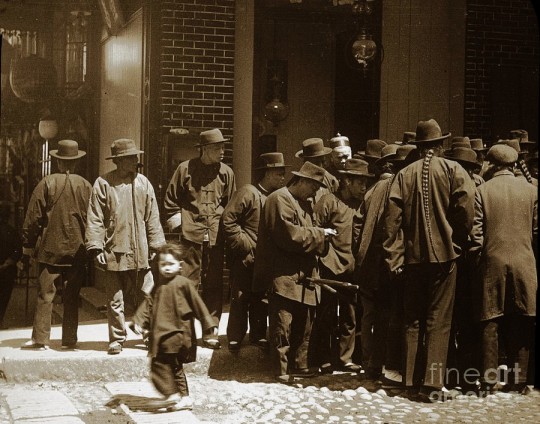
San Francisco Chinatown men with queues, c. 1900. Photographer unknown (from the Pat Hathaway archives).
When San Francisco Criminalized Hairstyle
In a time where hairstyles such as dreadlocks and cornrows have often become a cultural battleground, emblematic of personal expression and cultural identity, the echoes of the San Francisco Queue Ordinance still resonate. As a former staffer in the halls of the US Senate, I recall my boss's assertion during my inaugural week—a proclamation that "there are no new issues." I realized then and now that the often obscure legislation, rooted in different times, can cast a shadow on contemporary debates, illustrating pertinent struggles for autonomy and acceptance within minority communities.
In California, the San Francisco Board of Supervisors passed the Queue Ordinance in 1873. The was law intended to force prisoners in San Francisco, California to have their hair cut within an inch of the scalp. It affected Han Chinese prisoners in particular, as it meant they would have their queue, a waist-long, braided pigtail, cut off. The proposal passed by a narrow margin through the San Francisco Board of Supervisors in 1873. The ordinance was immediately vetoed by Mayor William Alvord. In his veto, the mayor stated that “this order, though general in its terms, in substance and effect, is a special and degrading punishment inflicted upon the Chinese residents for slight offenses and solely by reason of their alienage and race.”
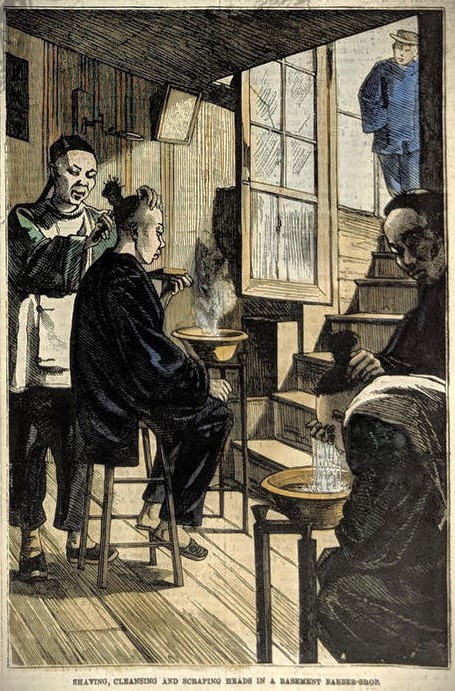
“Shaving, Cleansing and Scraping heads in a Basement Barber-shop,” June 6,1879, from the Frank Leslie’s Illustrated Newspaper.
An identical version of the law was enacted in 1876 and signed by a different Mayor Andrew Bryant. This set the stage for a federal case when a Chinese immigrant named Ho Ah Kow was arrested for living space violations under the city’s Cubic Air ordinance. Unable or unwilling to pay the fine for the violations, he was jailed. His jailers removed his queue during his incarceration.
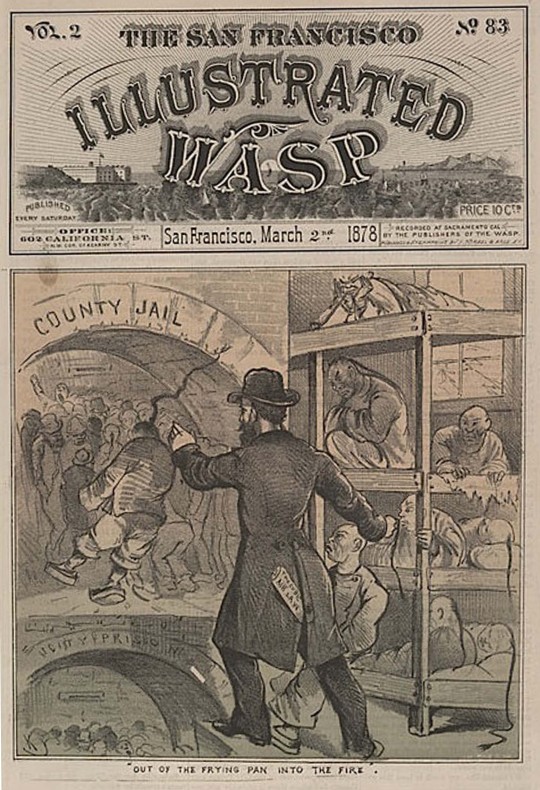
Ho sued then Sheriff Nunan for damages, claiming that the "Pigtail Ordinance" caused him irreparable harm.
On June 14, 1879, trial in a case about what the New York Times would later describe as “this childish attempt on the part of a community to persecute a race, in defiance of the Constitution and the laws” began in a San Francisco federal court, presided over by United States Supreme Court Justice Stephen Johnson Field.
On July 7, 1879, Justice Stephen Johnson Field — in spite of heated criticism from the general public and lampooning in the press — found in favor of the plaintiff.
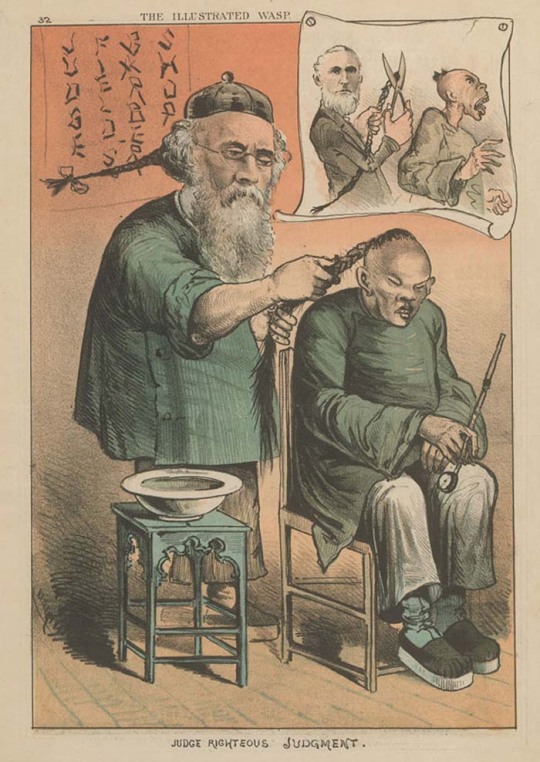
Field’s decision held that it was not within the powers of the Board of Supervisors to set such a discriminatory law and that the ordinance was, in fact, unconstitutional. In particular, he cited the Fourteenth Amendment to the United States Constitution which guarantees equal protection under the law to all persons within its jurisdiction. See Ho Ah Kow v. Nunan, 12 Fed. Cas. 252 (1879).
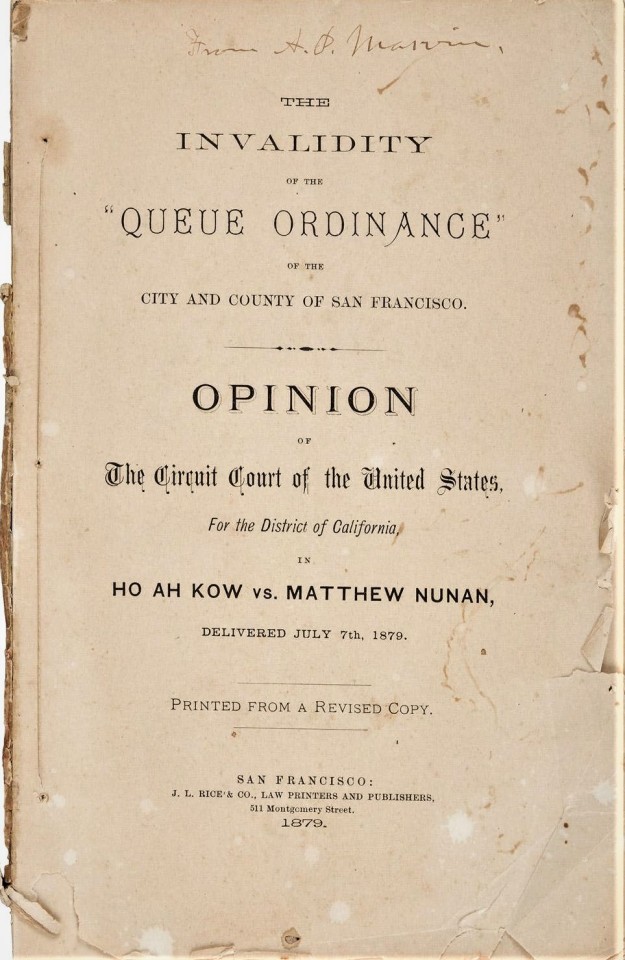
Nine days later, the New York Times reported Justice Field’s decision and the unusual “case in which the Constitution of the United States is invoked to defend a subject of the Emperor in China, temporarily residing in this country,” noting that “the cutting of the hair, otherwise, the cue, of the Chinese prisoner was not done to promote discipline or health. It was done to add torture to his confinement.”
The New York Times’ editors presciently observed the constitutional significance of the successful challenge to San Francisco’s Queue Ordinance, beyond the “cruel and unusual punishment” it inflicted, as follows:
"But, what is of more importance, the court held, in this case, that the whole spirit of the ordinance was in the violation of the Constitution and laws of the United States. It was intended only for the Chinese of San Francisco. ... And in our country hostile and discriminating legislation by a State against any persons of any class, creed, or nation, in whatever form it may be expressed, is forbidden by the fourteenth amendment of the Constitution.”
The district court’s decision was rendered seven years before, and served as precedent for, the landmark SCOTUS decision in Yick Wo v. Hopkins 118 U.S. 363 (citing Ah Kow v. Nunan).
Little is known about the fate of the plaintiff, Ah Kow. He was awarded $10,000 in damages. He undoubtedly had to wait a very long time before even contemplating a return to the motherland ruled by the Qing emperor.
In ensuing years, reform movements in China had begun demanding its removal as a badge of fealty, along with foot-binding and a change in constitutional government. In February 6, 1896, The San Francisco Call newspaper reported that the city’s Chinese residents were expressing concerns that wearing the queue as sign of loyalty to a foreign government could preclude native-born, Chinese San Franciscans from voting. More significant, The Call reported, “[t]here are about 500 voters in Chinatown now, . . . and before election day the Chinatown politicians expect to carry no less than 1000 in their vest pockets. At the last gubernatoral [sic] election 400 votes cast either way would have changed the result.”
Following the establishment of the Republic of China in 1912, Chinese American men gradually abandoned the traditional Qing-era queue, as part of a symbolic departure from the Manchu-dominated imperial rule. The queue, which had been enforced during the Qing Dynasty as a sign of submission, became a powerful visual representation of resistance against the old regime. In the early 20th century, as Chinese Americans' abandonment of the queue not only symbolized their alignment with modernity and progressive ideals in China but also a desire to integrate into the American sociopolitical landscape. This shift reflected not only a break from a past in which hairstyle had been weaponized against the community but also a conscious effort to redefine identity in the context of a new era.
------------------------
Text of the Ho Ah Kow v. Nunan decision may be read here.
4 notes
·
View notes